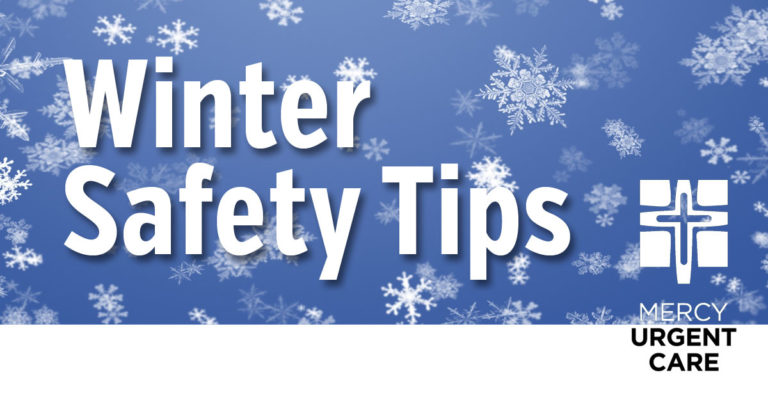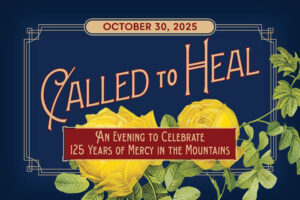 Despite winter’s weather howling at your door, it’s easy to feel safe and secure from the warmth of a cozy home, nestled up against the fire with hot cocoa in hand. But, when freezing temperatures and stormy weather combine, dangerous situations and health hazards can easily (and unexpectedly) arise.
Despite winter’s weather howling at your door, it’s easy to feel safe and secure from the warmth of a cozy home, nestled up against the fire with hot cocoa in hand. But, when freezing temperatures and stormy weather combine, dangerous situations and health hazards can easily (and unexpectedly) arise.
Mercy Urgent Care shares these tips and tricks to help you and your family stay safe this winter — because thinking ahead is critical in winter months, and, sometimes, danger lurks in the places you’d least suspect.
First, prepare for the long freeze by winterizing your home:
- Professionally service your heating system to ensure that it’s clean, working and ventilating properly.
- Test smoke detector batteries, install a carbon monoxide detector and have an alternate (and safe) source of heat, along with a supply of necessary fuel. (And never run a generator in a garage or other enclosed space, even if doors and windows are open.)
- Keep an emergency kit containing flashlights, a battery-operated radio, extra batteries, a first-aid kit, extra medicine and a cache of nonperishable food items that do not need to be cooked.
In addition to in-home safety, prepare your vehicle for winter road conditions by:
- Checking tire treads to ensure proper traction on slick roads.
- Keeping fuel lines free of ice by maintaining a full gas tank.
- Creating an emergency car-kit that includes a portable cell phone charger, blankets, food and water, a first-aid kit, jumper cables, a tire pump and a bag of sand or cat litter for emergency tire traction.
- Being aware of winter weather advisories and traffic conditions before driving — and avoiding travel when advisories are in place.
During a winter storm or blizzard, stay indoors as much as possible, wear warm, layered clothing and keep hydrated. And don’t forget your furry friends: Bring any pets or outdoor companion animals inside (or move to properly sheltered areas), and ensure that each animal has access to a constant supply of nonfrozen water.
According to the Centers for Disease Control and Prevention, cases of carbon monoxide poisoning drastically increase during winter — and a CDC study cites that, in January, at least two people die per day from the odorless, colorless gas. Given off by gas furnaces, cars, grills, propane stoves and portable generators, carbon monoxide gives little warning (headache, lightheadedness and nausea) to its presence and, in prolonged, steady doses, is fatal without proper ventilation.
To prevent carbon monoxide poisoning, the CDC recommends installing carbon monoxide detectors around the home (and testing detector batteries frequently) — and adhering to the following precautions when using heaters, stoves, generators or other sources of CO:
- Keep all generators or other gasoline-powered machinery outdoors, more than 20 feet from the home, and away from any windows, doors or vents.
- Ensure that all chimneys or vents are free of debris and lead outside the home.
- Never leave your vehicle’s motor running while parked in an enclosed or partially enclosed space, such as a garage — even if the door is open.
- Do not use a gas range or oven to heat a home — and do not use charcoal grills or portable gas camp stoves indoors.
- Call 911 immediately if CO poisoning is suspected.
When outdoors in freezing conditions, wear layered clothing, including water-repellent outer garments, gloves or mittens and a hat. Keep dry and watch for signs of hypothermia and frostbite — and remember that overexertion or strenuous outdoor labor (the kind that makes you sweat) can easily lead to hypothermia.
Avoid icy sidewalks and other slick surfaces when possible, and take the following precautions to protect against a slip or fall:
- Wear shoes with thick-treaded rubber or neoprene soles when walking on icy surfaces and prop yourself up by using a walking stick or gripping walls or handrails where applicable.
- Learn the penguin walk: Feet apart, knees slightly bent, arms out for balance — and take slow, shuffling steps.
- If a fall is inevitable, minimize impact by leaning forward, bending the elbows and knees and relaxing your muscles. Try to break the fall with your thigh, hip or shoulder, as bones in the arms, wrists and knees are easier to fracture — and protect your head from hitting the ground.
And, while you’re at it, come in for a flu shot! Vaccines are your body’s best defense against the flu, which ramps up during the colder months. Learn more about the flu shot (including a flu shot FAQ) here.
Cold weather comes and goes each and every year. But don’t be caught off-guard. Save yourself some slips and chills, and, from all of us at Mercy Urgent Care, have a safe winter.

